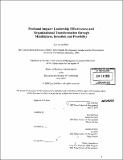| dc.contributor.advisor | Neal Hartman. | en_US |
| dc.contributor.author | Griffiths, Lisa (Lisa Michele) | en_US |
| dc.contributor.other | Sloan School of Management. | en_US |
| dc.date.accessioned | 2009-11-06T16:32:55Z | |
| dc.date.available | 2009-11-06T16:32:55Z | |
| dc.date.copyright | 2009 | en_US |
| dc.date.issued | 2009 | en_US |
| dc.identifier.uri | http://hdl.handle.net/1721.1/49771 | |
| dc.description | Thesis (M.B.A.)--Massachusetts Institute of Technology, Sloan School of Management, 2009. | en_US |
| dc.description | Includes bibliographical references (p. 68). | en_US |
| dc.description.abstract | This thesis is an examination of the convergence of ideas in science, psychology, organizational theory and leadership development around ideas of interconnectedness, mindfulness, intention and transformation. First, I explore how the fields of quantum physics and natural sciences are shedding new light on the power of our thoughts, feelings, and intentions to create our world. In this way, these non-tangible things have impact on the tangible world, both our own experience of it and the experience of the whole. Further, when we begin to see the study of management and organization as the study of human communities, rather than as transactional machines, we realize the interconnections and the possibility for change by focusing on communications and relationships. Delving into organizational leadership, I regard a leader as a potential change agent, but not the sole actor of change. Key to this idea is the assertion that change happens in relation to the world and people around oneself - fundamentally, in relation. While individual reflection and spiritual work are important to setting a course for change, it is in relation to others that we act. In these actions and conversations we create and are created. Therefore when we engage in work of change management, seeking to change individual behaviors or organizational outcomes, we must address the whole. Change targeted at the individual alone is insufficient. | en_US |
| dc.description.abstract | (cont.) Finally, I suggest that this new way of regarding organizational leadership and management has the potential to radically transform business education and leadership theory for the 21 st century. Previous organizational environments dominated by competition and scarcity are being replaced by environments of collaboration, abundance and possibility. | en_US |
| dc.description.statementofresponsibility | by Lisa Griffiths. | en_US |
| dc.format.extent | 68 p. | en_US |
| dc.language.iso | eng | en_US |
| dc.publisher | Massachusetts Institute of Technology | en_US |
| dc.rights | M.I.T. theses are protected by
copyright. They may be viewed from this source for any purpose, but
reproduction or distribution in any format is prohibited without written
permission. See provided URL for inquiries about permission. | en_US |
| dc.rights.uri | http://dspace.mit.edu/handle/1721.1/7582 | en_US |
| dc.subject | Sloan School of Management. | en_US |
| dc.title | Profound impact : leadership effectiveness and organizational transformation through mindfulness, intention and possibility | en_US |
| dc.title.alternative | Leadership effectiveness and organizational transformation through mindfulness, intention and possibility | en_US |
| dc.type | Thesis | en_US |
| dc.description.degree | M.B.A. | en_US |
| dc.contributor.department | Sloan School of Management | |
| dc.identifier.oclc | 457058210 | en_US |
